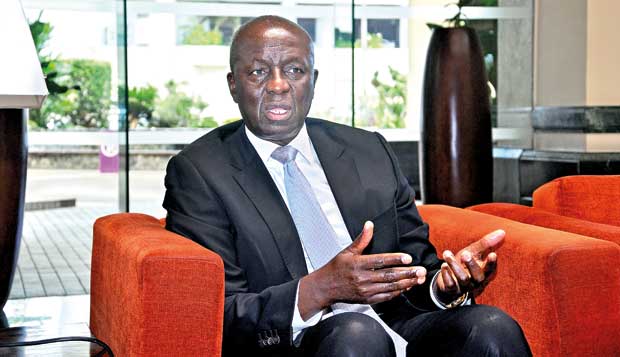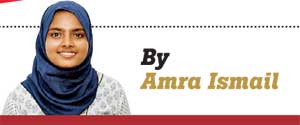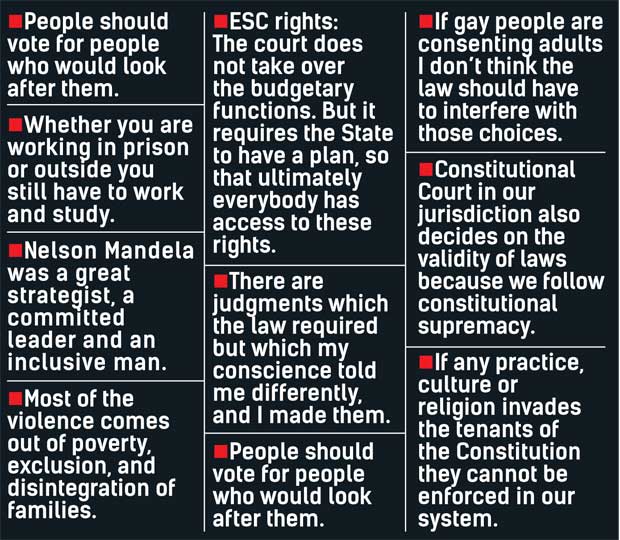Reply To:
Name - Reply Comment
Last Updated : 2024-04-16 21:36:00

 1994. In 2005 he was appointed as the Deputy Chief Justice and he retired last year in May. His memoir ‘My Own Liberator’ unfolds his awe - inspiring life story. In an engaging interview with the Daily Mirror during his recent visit to Sri Lanka, Justice Dikgang Moseneke shared inspiration from his remarkable life during and after apartheid, and the South African experience of constitution making.
1994. In 2005 he was appointed as the Deputy Chief Justice and he retired last year in May. His memoir ‘My Own Liberator’ unfolds his awe - inspiring life story. In an engaging interview with the Daily Mirror during his recent visit to Sri Lanka, Justice Dikgang Moseneke shared inspiration from his remarkable life during and after apartheid, and the South African experience of constitution making.
If you are a freedom fighter your responsibility is to change society and you must be armed for that task. Isn’t it? You have a job at hand. If you want to be a great chef what do you do? Learn how to be a good chef and you learn all the good recipes, so you could have a good outcome.
It’s the same thing. I have reasoned when I was young that if you are a freedom fighter and if you want to change society, I have to be well equipped, and I wanted to be a lawyer- an Activist lawyer- when I came out of prison. So I studied for that. I didn’t know how long we were going to take to defeat apartheid. But I knew that I needed to stay focused, and be an honest lawyer, a hard working lawyer.
The harder it goes the more you have to work. And I did that. I registered with a long distance university and made sure that I passed through the course work in the evening after working as a prisoner during the day. In the evening I would take a cold shower and I would work. I would study and there was no short cut. Whether you are working in prison or outside you still have to work and study.
In the last chapter of ‘My Own Liberator’ I ask the question ‘Was it all in vain?’ So I am examining that and saying ‘look at the great struggle we had. Look at the great leaders we had.’ I write a lot about Nelson Mandela and other leaders. My favourite leaders are Oliver Tambo and Robert Sobukwe. Once you’ve talked about their greatness you must come to today.
He was a great strategist, a committed leader. He knew how to soak up pain while at the same time how to forgive. Twenty seven years in prison. We sometimes forget the brutality. He had children who grew up in his absence. He had a very beautiful wife who lived for 27 years without him and I write about that and my role in defending Mrs. Winnie Mandela at the request of Mr.Mandela, when she was charged,. He was an inclusive man. I was from the Pan African Congress and not from the African National Congress. It mattered nothing to him. He just wanted a good comrade, a patriot who is committed and asked me to be his executive from among his comrades. So he was an inclusive man and inclusive also with the oppressors. He didn’t recognize those lines, those thin lines among human beings. It is what we do and the contribution we make that matters, and not how you look. It helps if you have a bit of looks in life (laughing) but that is just the beginning.
We had to exploit the loops in a bad legal system. But our duty was to protect communities and activists. I knew that I had to help protect people in detention. I knew that my work is to help my comrades, in other words to provide ambulance service to those people who were hurt in their struggle, those who were in trouble. Sometimes I would collect money for comrades to study on Robben Islands and money for their families to be supported. It was quite a time. I was a lawyer and a freedom fighter all at once.
The legal system is failing by and large. I agree with you there in the sense that whilst it is operating well and trials are going on we have not succeeded to curb violence that comes from socio-economic conditions. Remember that most of the violence comes out of poverty, exclusion, and disintegration of families. So we have not succeeded to produce a peaceful society, and part of the violence is historical and we are struggling with that issue. The statistics are high. South Africa is more violent than Sri Lanka.
I think poor people in South Africa use the system. It is true that the societies aren’t equal. It is true that we are struggling with unemployment, with financial inequality, and with access to some of the important things that destroy property. It is true that the current government has lost focus in the sense that they are looking more at themselves and less and less at the people. When I talk to working class people I say to them you have the responsibility to make sure that you find leaders who will do what you need and what you want. Most people just vote, but actually people should vote for people who would look after them. This remains a challenge. In fact it is called the social distance in South Africa and it’s still big. The future governments must work hard to deal with the issue of poverty and social inequality. There is full political equality but there is no social equality.
In our democracy the Constitutional Court is the ultimate arbiter on constitutional disputes. An example of a dispute would be a breach of the fundamental right to freedom. Let’s say that there is a breach of your right to practice your religion and we’ve had cases like that. You then go to the Constitutional Court and ask it to protect you against the invasion of your right to practice your religion. That is why we have a charter of fundamental rights. If anybody, including the state, breaches them the Constitutional Court decides on that. The Constitutional Court in our jurisdiction also decides on the validity of laws because in our system we follow constitutional supremacy. So no law can be in conflict with the constitution.
In our case we created a Constitutional Court because we introduced a new constitution and we wanted new judges to create a new jurisprudence. In your case if there is a constitutional chamber it’s going to depend on what powers it has.

Let’s start with the argument that unelected judges should not have the power to make decisions about socio-economic rights. It is true that judges are not elected. But it is not true that when they decide on socio-economic rights they are actually invading the budget. When that happens it happens on the periphery. Let me give you an example. When you go to court in our jurisdiction and say I want access to education, the court will ask the government whether they have made plans for this person to have access to education. The government will have to show that they have and that they have plans to extend and allow access to education. So the court does not take over the budgetary functions. It does not decide on how much money you use on education. But it requires the State to have a plan, so that ultimately everybody has access to education. So the argument mischaracterizes the role of judges.
The second thing is that poor people and those who have no means of their own must be able to hold the government accountable. Some would say, well, they must do it every five years. True, that they must also do. But in between the elections if you have no access to water what should you do? You should be able to go to a court and say I have no access to water. The government will then be held to account about why they haven’t brought water to this community, what the plans are and whether there are funds to fulfill those plans.
In our system everybody has a right to be a Muslim, to belong to the Hindu religion, the Christian religion or no religion. The constitution specifically protects that right. But nothing will be protected which is inconsistent with the Constitution. For instance, under African customary law, the law was that women don’t inherit and only adult male children can inherit. We find this system called male primogeniture in many societies where only men inherit. When that came before the court we struck it down. We said no, that it is inconsistent with the Constitution. If we allow that, it means that all women who fall under African tradition will always be poor and the boys will always inherit. So in fact you increase gender inequality. If any practice, culture or religion invades the tenants of the Constitution they cannot be enforced in our system. They are not valid. For instance, South Africa is struggling for instance with issues of child marriage. In our system a child is defined as someone who is below the age of 18 and therefore you cannot marry someone who is a child, and that would be enforced. So yes, fundamental rights will alter cultural practices which are inconsistent with the Bill of rights.
Yes. There were judgments which the law required but which my conscience told me differently, and I made them, and that’s an important thing. For instance, I vowed as a judge that I will treat all South Africans fairly including those who were former oppressors. Once you take the oath in our system you cannot treat other people differently because they are members of that political party, or they are from that race, or from that culture. It is forbidden completely. When I took the oath I seriously told myself I will treat fairly, even white South Africans who were in the past oppressors of South Africa. So that’s something quite important that I had to live with. I am heterosexual, but I understood very well the importance of protecting the choices that LGBT people made. So I don’t have to be homosexual myself to understand and accept that they have a right to make choices, and those choices must be respected. If gay people are consenting adults I don’t think the law should have to interfere with those choices and that is just one example. Other choices are about religion, pregnancy, whether to make love or not, about how people want to eat etc. Those are choices that are personal and ought to be allowed.
I’m writing another book about my fifteen years on the bench for young lawyers around the world, not just South Africa. I hope to tell you what it is to be a judge and what your responsibilities are and what changes you can make. I get invited to different parts of the world. I’ve been to the Oxford University, the University of New York, the University of Zurich Law School and I write about all of that.

Add comment
Comments will be edited (grammar, spelling and slang) and authorized at the discretion of Daily Mirror online. The website also has the right not to publish selected comments.
Reply To:
Name - Reply Comment
On March 26, a couple arriving from Thailand was arrested with 88 live animal
According to villagers from Naula-Moragolla out of 105 families 80 can afford
Is the situation in Sri Lanka so grim that locals harbour hope that they coul
A recent post on social media revealed that three purple-faced langurs near t